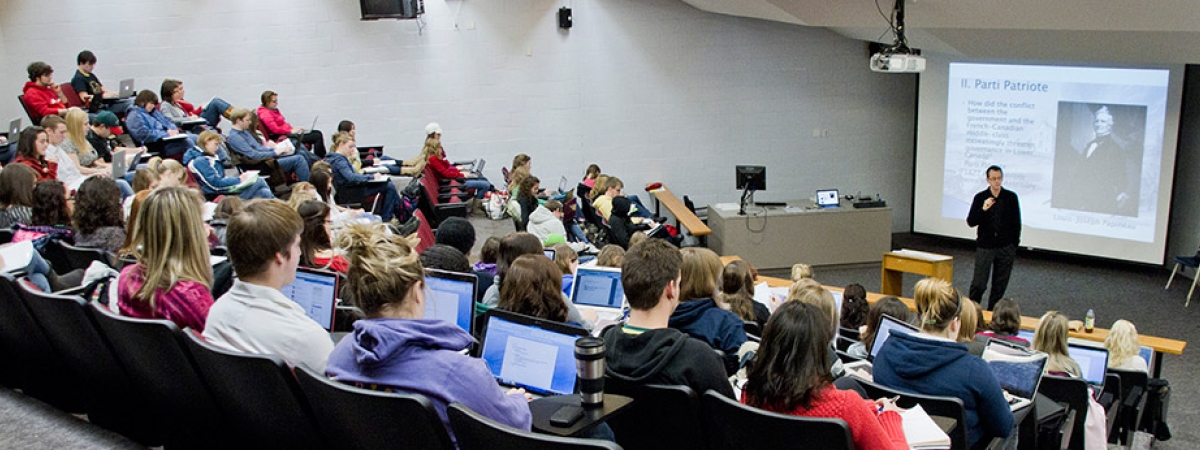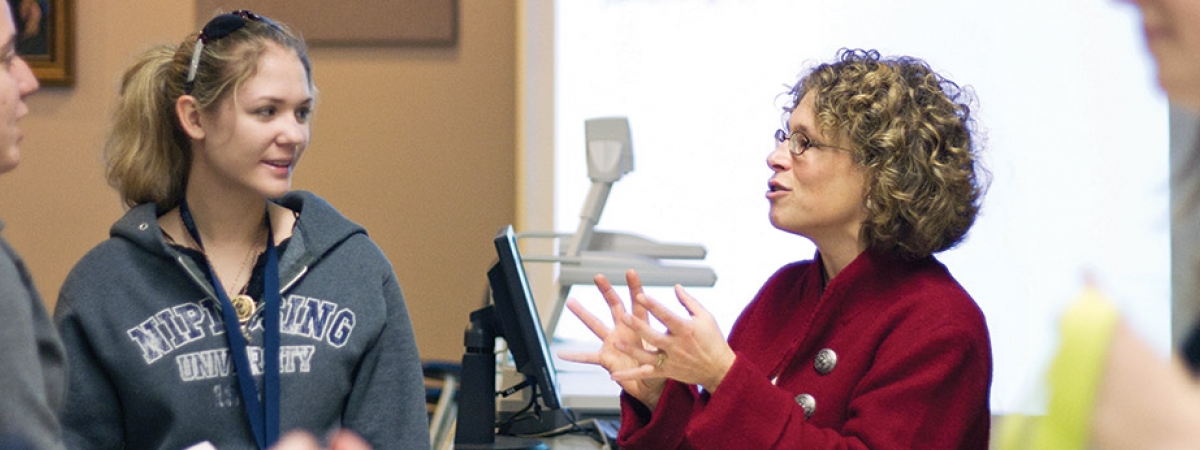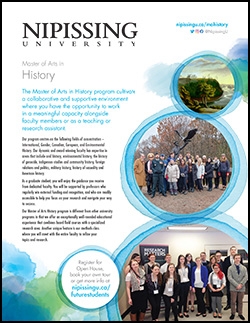Master of Arts in History in our School of Graduate Studies
The Master of Arts in History program consists of course work, a Major Research Paper, and a presentation of research at the annual Graduate Student Conference. It is offered as both a one-year full-time program (three consecutive terms: Fall, Winter, and Spring/Summer) or on a three-year flex-time program (nine consecutive terms). Our program centres on the following fields: International, Gender, Canadian, European, and Environmental history. Our dynamic and award-winning faculty has expertise in areas that include environmental history, the history of genocide, indigenous studies and community history, foreign relations and politics, and military history and the history of espionage.
- Program
- Admissions, Applications, and Dates
- Tuition and Funding
- Facilities
- Resources
- Our People
- Opportunities
Master of Arts in History (MA)
- Graduate Admission Requirements
- Program Requirements
- Graduate Studies Program and Degree Requirements
- Available History (HIST) Courses
- Complete listing of all courses
Students in the Master of Arts in History program take compulsory seminars in four of the five following areas each year. These are also areas in which the expertise of our Faculty allows us to supervise Major Research Papers.
International History
Our international history concentration offers three major areas of focus. The first analyzes the history of the Cold War, the second the study of international law and war crimes tribunals. The third focuses on foreign policy and international relations, specifically in Great Britain, the United States, the Soviet Union, Germany, France, and Canada.
Gender History
Our gender history concentration investigates gender in a range of contexts across historical periods and geographic boundaries. Scholars examine the impact of constructions of gender on work, family relations, religion, the military, and sexuality.
Canadian History
For any given period from colonial times to the present, the Canadian course will focus on a theme relevant to today’s world such as the state and resource development, the environment and food, the family, oral history, colonization, and decolonization.
European History
Our European history concentration examines Europe from the medieval to the modern era. Our faculty have expertise in the national histories of Britain, Germany, and Russia, as well as topics such as war and society, the Holocaust and comparative genocide studies, military history, and the history of medieval Europe.
Environmental History
Explore environmental history as a sub-field of history, focusing on the challenge it poses to other, human-centered subfields of history, as well as its links to historical geography and the environmental sciences.
Tuition and Fees
Funding and Financial Aid - Scholarships, Bursaries and Awards
Funding is available to graduate students from both internal and external sources. Internal funding includes teaching/research assistantships, faculty research grants, and Nipissing Graduate Scholarships. The value of these scholarships varies. Students are also encouraged to compete for scholarships from the Social Sciences and Humanities Research Council (SSHRC), the Natural Science and Engineering Research Council (NSERC), the Canadian Institutes of Health Research (CIHR), the Ontario Graduate Scholarships (OGS), the Canada Graduate Scholarship, and the Mackenzie King Memorial Scholarship.
Nipissing University not only provides its graduate students with attentive faculty and a supportive community, but also offers physical spaces that are conducive to productive research.
Our graduate students study and teach in state-of-the-art classrooms, seminar rooms, and research labs. Our graduate student lounge and interdisciplinary office provides students with their own dedicated space to meet and collaborate.
The Harris Learning Library was completed in 2011 and provides 56,000 square feet of study space with natural light and a modern award-winning design. The new library features expanded print collections, a learning commons, an adaptive technology area, and collaborative work spaces.
Graduate Student Centre - R229
Nipissing University graduate students have access to an interdisciplinary office facility designed to be a central place for graduate students to study and interact with each other. The Graduate Student Centre totals 833 square feet and is able to accommodate more than 60 students. In addition, the Graduate Student Centre is equipped with a telephone, wireless and hardwired internet, and access to shared printing.
All graduate students are eligible for access to the Graduate Student Centre. Keys are assigned by the Vice-President Operations office, B215. Students are required to pay a $25.00 deposit for a key in the Finance office prior to receiving their key.
There are 30 individual study carrels along the perimeter of the room that are assigned to individual students, or two who request to share. Assignments of designated spaces will be on a first come first serve basis.
Graduate Studies Resources
- Graduate Studies Regulations
- Graduate Studies Procedures
- Graduate Studies Forms
- Graduate Studies Glossary
- Graduate Student Card Application
- Centre for Literacy
Major Research Paper/Thesis Resources
- MRP/Thesis Defence Process
- MRP/Thesis Supervisory and Examination Committees
- MRP/Thesis Final Submission Process
Master of Arts in History Resources
Nipissing University History Department Style Guide
This guide will help you format and style your academic documents and submissions properly. Click here for our History Department's Style Guide.
Post-Graduation Opportunities and Careers
Many of our Master of Arts in History graduates have gone on to doctoral studies, as well as advanced research positions in a variety of fields, including business, government, politics, heritage, the environment, and teaching.


















